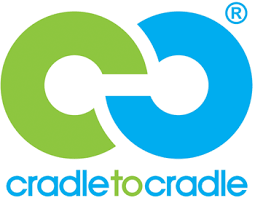The circular economy is on our minds this week as the Hub Culture Innovation Campus and Beach Club hosts conversations on cradle-to-cradle thinking. What is cradle-to-cradle and how can C2C approaches be applied to small island states like Bermuda?

The cradle-to-cradle concept examines the idea of use and reuse in systems: the idea that materials should not just be used and thrown away, but designed from the outset for reuse, over and over again. Recyclability is a core component of this - reusing aluminum or plastics by capturing them at the end of their first life, but also looking at design approaches that embody either biological or technical processes to elimate non-reuse compounds, chemicals or other inorganics.
The intellectual spark and a major visionary of the circular economy is William McDonough, the architect and designer responsible for the ICEhouse™project at Hub Davos and the driving force behind McDonough Innovation, a multidisciplinary firm focused on designing, establishing and building circular economy projects. From "good" fashion to carbon positive factories, McDonough's impact is widely felt, especially among a new generation of designers, architects and environmentalists coming through the ranks.
Also in Bermuda for cradle-to-cradle week were Mandy Adams and Addie Adams, representing their partnership with the Campus through Lothian Salvage. Lothian combines technology with reclamation through an app that allows builders and contractors to list and sell salvage at scale, providing a hands-on template for massive efficiency gains in building and fittings reclamation. With the Lothian app, users will be able to shop for reclaimed material, sourcing it directly from buildings being refurbished or renovated.
For Bermuda, the focus is squarely on how renewable energies including wind and solar can drive cost reductions for citizens. The cost of solar has dropped has low as 8 cents per kilowatt hour, which compares to the current average cost of 19.5 cents per kilowatt hour on the island. The cost of infrastructure build and maintenance in a place where salt and sea corrode everything must be considered, but the future for solar, and wind (which exists in abundance) seems brighter than ever.
Cradle-to-cradle thinking goes beyond energy to materials and waste - how could Bermuda use its position in the middle of the Atlantic gyre (a revolving cauldron of plastic in the ocean) to generate plastic renewability, with treatments that reverse process plastics to oil, creating a new export product for the country? How can wave power be harnessed to provide energy, creating a new type of 'blue halo'? How can organic farming combined with solar provide lower cost food for citizens, using waste treatments that are cutting edge?
All of these questions, as McDonough says, are simply 'sparks' created by this attention and focus. It remains to be seen where the sparks land, or the solutions they create.
Article Image
To learn more about William McDonough and the 5 Goods, see McDonough Innovation.
Find out about the Cradle to Cradle movement.
To learn more about Mandy Adams, visit Lothian.
Hi! I am a robot. I just upvoted you! I found similar content that readers might be interested in:
https://hubculture.com/hubs/776/news/793
Bienvenido a Steemit! Este Post puede tener muchos upvotes con la ayuda del King: @dineroconopcion, El cual es un Grupo de Soporte mantenido por @wilbertphysique, @yoenelmundo y 5 personas mas que quieren ayudarte a llegar hacer un Top Autor En Steemit sin tener que invertir en Steem Power.Te Gustaria Ser Parte De Este Projecto?
Welcome to Steemit! This Post can have many upvote's with the help of the King's Account: @dineroconopcion, It's a Support Group run by @wilbertphysique, @yoenelmundo, and 5 other people that want to help you be a Top Steemit Author without having to invest into Steem Power. Would You Like To Be Part of this Project?